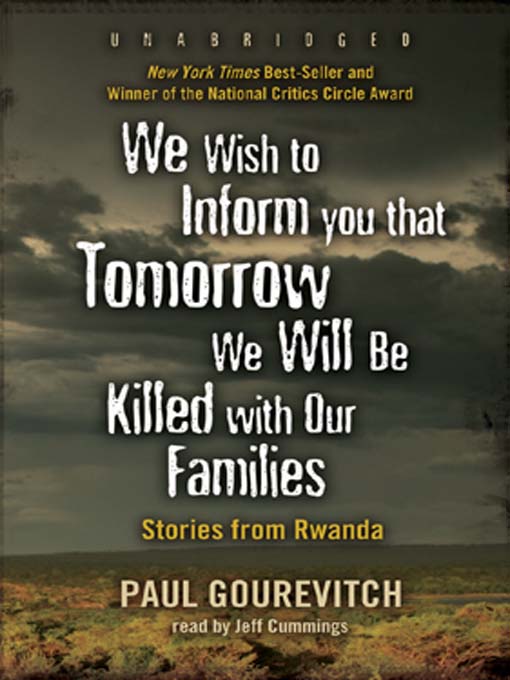
We Wish to Inform You That Tomorrow We Will Be Killed with Our Families
Stories From Rwanda
کتاب های مرتبط
- اطلاعات
- نقد و بررسی
- دیدگاه کاربران
نقد و بررسی

A dramatic account of the genocide in Rwanda during the mid-90s, this story presents listeners with every aspect of the tragedy from start to finish. Journalist Philip Gourevitch offers an informative and passionate account that allows the material to speak for itself. Narrator Jeff Cummings reads with a matter-of-fact tone, capturing the identities and voices of the Rwandans who play a crucial role in events without trying too hard to emphasize their accents. The result is an ardent story that will command listeners' attention and touch their emotions. Cummings bridges the gap between the audience and the events of 1994 by transporting them to Africa during some of Rwanda's darkest days. L.B (c) AudioFile 2008, Portland, Maine

August 31, 1998
What courage must it have required to research and write this book? And who will read such a ghastly chronicle? Gourevitch, who reported from Rwanda for the New Yorker, faces these questions up front: "The best reason I have come up with for looking more closely into Rwanda's stories is that ignoring them makes me even more uncomfortable about existence and my place in it." The stories are unrelentingly horrifying and filled with "the idiocy, the waste, the sheer wrongness" of one group of Rwandans (Hutus) methodically exterminating another (Tutsis). With 800,000 people killed in 100 days, Gourevitch found many numbed Rwandans who had lost whole families to the machete. He discovered a few admirable characters, including hotelier Paul Rusesabagina, who, "armed with nothing but a liquor cabinet, a phone line, an internationally famous address, and his spirit of resistance," managed to save refugees in his Hotel des Milles Collines in Kigali. General Paul Kagame, one of Gourevitch's main sources in the new government, offers another bleak and consistent voice of truth. But failure is everywhere. Gourevitch excoriates the French for supporting the Hutus for essentially racist reasons; the international relief agencies, which he characterizes as largely devoid of moral courage; and the surrounding countries that preyed on the millions of refugees--many fleeing the consequences of their part in the killings. As the Rwandans try to rebuild their lives while awaiting the slow-moving justice system, the careful yet passionate advocacy of reporters like Gourevitch serves to remind both Rwandans and others that genocide occurred in this decade while the world looked on.

























دیدگاه کاربران